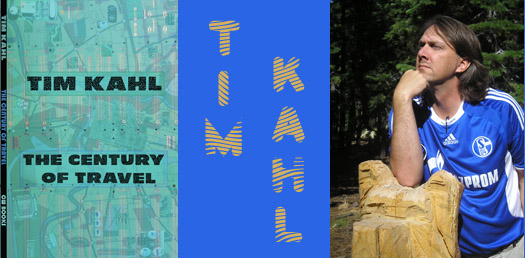Tim Kahl
The Century of Travel
Book Release Reading
1719 25th Street at SPC
Host: Rebecca Moos-Morrison
Tim Kahl’s poems are tough and necessary–
— Joseph Lease
Tim Kahl’s poems are an “open source” for the end of the West. These big, bold poems swerve between history and pop culture, between nineteenth century bull and bear baiting to twenty-first century bull and bear markets. The Century of Travel records the brainy, mournful, maniacal music of our colony collapse. Kahl discovers in the California Central Valley our new American habitat of foreclosed sub-divisions, dying turtles, homeless encampments, and the residue of all of our striving. Again and again, his poems push back against elegy with energy. In writing about his brother, Kahl may have been describing himself: “This man has a heart trained for/perilous rhythm.”
— Camille Norton
In The Century of Travel Tim Kahl searches for his California among gold miners, truck drivers and suburbs, the Yahi and Californios, gamblers and senators, the lawless and the Law, a fugitive California on the edge of all or no civilization where Sacramento, “this city built by failures,” is ever “rising from an ancient sea bed.” Demanding all of poetry’s powers, in praise, satire and elegy, there is a sincere effort here to figure it all out for a man and a landscape in crisis. As urban pastorals crossing between centuries, Kahl’s poems travel by train, traffic jam and internet, through space and time—but to where? Having come so far, where is there yet to go? Indeed, with a sense of “something gaining on me,” Kahl answers “everywhere” and “home” and “now!”
— Chad Sweeney
Tim Kahl is the perpetrator of many unacknowledged hoaxes and much chicanery par excellence. He is the author of Possessing Yourself (CW Books, 2009) though many scholars and critics point out that this book is probably the work of Victor Schnickelfritz, Kahl’s arch-villain and ne’er-do-well doppelgänger. Some assert that radiocarbon dating of the first copy of the manuscript would determine its origin. Others say they should just check the date the file was created. He has published many poems and reviews and videos. He has published other people’s poems too. During his days in Ohio he learned to speak fluent grackle, and this has taught him to interpret the ways and means of the Sacramento crows. In Ann Arbor he learned to eat kimchi. In Chicago he held his breath the day he wandered aimlessly into Cabrini Green. He currently houses his father’s entire literary estate — one volume: Robert Gerstmann’s book of photos of Chile, 1932.





